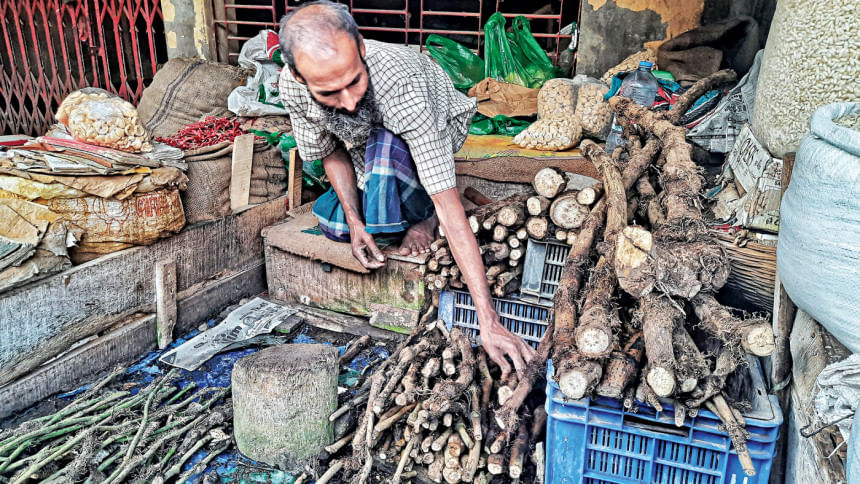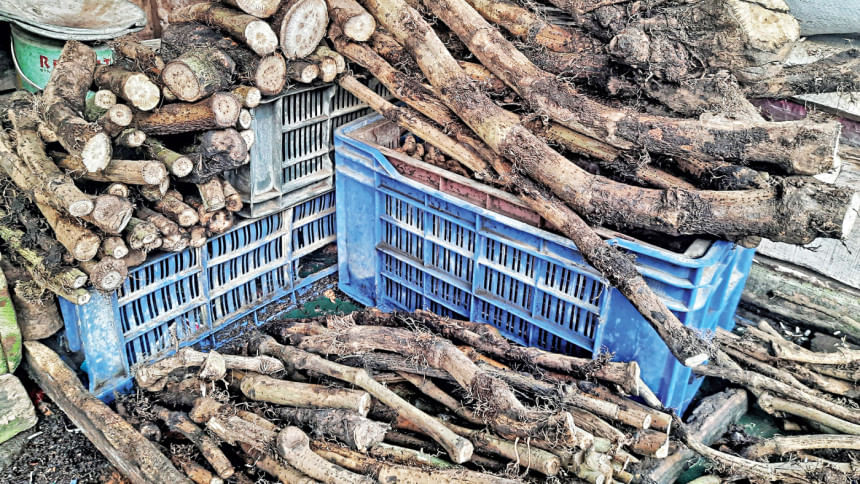Chui jhal farming spreads

Things that immediately come to mind when someone thinks of Khulna are the world's one of the largest mangrove forests Sundarbans and delicious shrimps. But the southwestern city is also home to food dishes prepared with piper chaba, locally known as chui jhal, whose popularity is growing rapidly.
One of the most desirable food ingredients in the southwestern region, chui jhal is also winning the hearts of the people beyond the division and abroad, attracting more farmers into cultivating it.
According to agronomists, the botanical name of chui jhal is piper chaba.
Chui trees look like betel leaves vines. Its roots and stems are cut into pieces and used in cooking.
Chui jhal, which tastes salty, is widely known as a spice in the southwestern districts, namely Khulna, Satkhira, Bagerhat, Jashore and Narail.
It is being cultivated on 110 hectares of land in Khulna, Bagerhat, Satkhira and Narail, which collectively produce 346 tonnes of the item annually. Some 3,570 farmers are involved in the cultivation of the crop in the four districts, agriculture department data showed.
It is usually used in meat. However, many people cook fish or vegetables with chui. Street food vendors also use it to enhance the taste.
Taking advantage of its popularity, many restaurants have sprung up in and outside of the southwestern city. Food lovers from different parts of the city and even from other parts of the country flock to these restaurants to taste the food items.
Abbas Hotel, located in the Chuknagar area of the Khulna city, is known for its mutton dish prepared with Chui jhal. More than 100 restaurants run their business centring the dish in the city as well.
Chui cuttings can be planted on higher ground. The months of Baishakh- Jaistha and Ashwin-Kartik are the best time to plant it.
Chui jhal is so popular in Khulna that it has been proposed to be branded as the region's agricultural product.
Chui is being sold at Tk 500 to Tk 1,600 per kilogramme. The lower part of Chui is the most expensive while stems and pulses are also sold at good prices.
"Chui jhal is a potential agricultural product in the south and southwest of the country. The demand is increasing day by day due to its medicinal aspect," said Md Inshad Ibne Amin, agriculture officer of Dumuria upazila.
In Dumuria alone, Chui is being cultivated on 45 hectares of land.

In the southern part of the country, the production of Chui vine seedlings has already generated a lot of interest in the trade.
Amin said one can earn from the chui farming a year after planting and it is possible to generate up to Tk 4 lakh annually in three to four years if the item is grown on only two to three decimals of land.
Chui farming is expanding across the Khulna region rapidly.
Small and big Chui jhal nurseries have spawned in many villages of Khulna. Farmers from other districts are also showing keenness in cultivating them and are taking saplings from the farmers based in Khulna.
Nabodip Mallick, of Baratia village of Dumuria, has been running Chui Nursery since 2016. So far, he has sold about 60,000 saplings with each bringing Tk 30 on average. He has about 80,000 saplings in his nursery at present.
He earns Tk 25 lakh to Tk 30 lakh every year just by selling chui and its seedlings.
He said people from different parts of the country buy saplings from him and he supplies them through courier service providers.
"I have supplied saplings to people from all 64 districts in the country. Several farmers have set up nurseries. They are all succeeding."
Md Faridul Hassan, additional director of the Department of Agricultural Extension in Khulna, says chui jhal is a viable agricultural product.
"Thanks to its medicinal properties, its use and popularity are increasing. We are constantly motivating farmers to cultivate it. We are giving them suggestions so that they can get buyers at home and abroad."

 For all latest news, follow The Daily Star's Google News channel.
For all latest news, follow The Daily Star's Google News channel. 





Comments